Brunton’s quasi-cranks are largely indifferent to the challenges of community. They are individualists united in their belief that greed is good, whether because it hastens the emergence of Hayekian “spontaneous order,” or speeds the coming of the Singularity whose benefits will infinitely dwarf any possible costs, or keeps what’s mine away from what the government can touch. And at times, they have a point. The “censorship-resistant” nature of Bitcoin’s blockchain technology makes it difficult for authoritarian governments to spy on dissidents; corrupt local officials to manipulate land titles to steal from peasants; and distributors to pass off low-quality fish, diamonds, or pharmaceuticals for the real thing. It also makes it hard to police money laundering, terrorist financing, and fraud, which are significant problems for the Bitcoin economy.
Greed is good just like ice cream is good — in moderation. Unconstrained, it produces not just the get-rich-quick mentality decried in The White Paper; it leads to the corrosive inequalities and social dysfunction of today’s United States. The belief in Bitcoin and other cryptocurrencies as platonic systems that eliminate the need for human governance nurtures an ethos of anything-goes nihilism. Bitcoin was conceived of as a way to replace central bankers with the infallible execution of software algorithms: rule by law embodied in code and cryptography. Yet, because it accords no special significance to decisions made by democratically elected and legally sovereign governments, the movement that developed around Bitcoin stands in direct opposition to the normal understanding of “the rule of law.” It is thus no surprise that prominent figures, such as economist and New York Times columnist Paul Krugman, believe that “Bitcoin is evil.”
Brunton tells the story of Bitcoin as the payoff for the quixotic and failed experiments that came before; it was the realization at last of the dream of passing current through the ether of a ubiquitous global data network. And yet at the end of his book he acknowledges the project’s ultimate emptiness if all that effort, and the fantastic amounts of computer processing and energy usage today dedicated to cryptocurrency mining, has no greater purpose:
